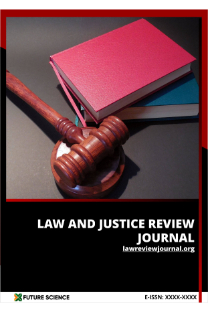THE NEW TAX ISSUE: TAXING ROBOTS
Yeni Vergi Konusu: Robotların Vergilendirilmesi
___
Brederode Robert van, “Introduction”, Science, Technology and Taxation, Editor: Brederode Robert van, Wolters Kluwer, Series on International Taxation, Volume 40, 2012Kweku K. Bentil, American Association of Cost Engineers. Transactions of the American Association of Cost Engineers; 1989; Accounting, Tax & Banking Collection.
Bird Richard M. Zolt Eric M., “Technology and Taxation in Developing Countries”, Science, Technology and Taxation”, Editor: Robert F.Brederode, Wolters Kluwer, Series On International Taxation, Volume 40, 2012.
Bozkurt Yüksel Armağan Ebru, Robot Hukuku, Türkiye Adalet Akademisi Dergisi, Yıl:7, Sayı: 29, Ocak 2017.
Clarke Roger, “Asimov’s Laws for Robotics: Implications for Information Technology”, Part 1 and Part 2, Computer, December 1993, pp. 53-61 and Computer, January 1994”, (www.rogerclarke.com.au)
Cousins Steven, “Is A Robot Tax Really An Innovation Penalty”, (www. techcrunch.com)
Dowling Kevin, “What is Robotics?”, (www.cs.cmu.edu)
Gless Sabine, Silverman Emily, Weigend Thomas, “If Robots Cause Harm, Who Is To Blame? Self-Drıvıng Cars And Crımınal Liability”, New Criminal Law Review, Summer 2016
Hauser Marcus, “Do Robots Have Rights? The European Parliament Addresses Artificial intelligence and Robotics”, (www.cms-lawnow.com)
Kaminski Margot E., “Robots In The Home: What Will We Have Agreed To?”, Idaho Law Review, 2015 (Lexis Nexis online database)
Malcolm James, “Could Bill Gates’ plan to tax robots really lead to a brighter future for all?”, (www.theconversation.com)
Merler Silvia, “Taxing Robots”, (www.bruegel.org)
Oberson Xavier, “Taxing Robots? From the Emergence of an Electronic Ability to Pay to a Tax on Robots or the Use of Robots”, World Tax Journal, 2017 (Volume 9), No. 2
Reid Melanie, “Rethinking The Fourth Amendment In The Age Of Supercomputers, Artificial Intelligence, And Robots”, West Virginia Law Review, Spring 2017,(Lexis Nexis online database)
Robert J. Shiller, (www.weforum.org)
Sixsmith Andrew, Mihailidis Alex, Simeonov Dorina, “Aging and Technology: Taking the Research into the Real World”, Public Policy & Aging Report, 2017.
Visco Vincenzo, “Getting The Robots To Pay Tax”, (www.socialeurope.eu)
Yüksel Bozkurt, Armağan Ezgi; “Robot Hukuku”, Türkiye Adalet Akademisi Dergisi, Yıl:7, Sayı:29, Ocak 2017.
www.businessinsider.com
www.cnbc.com
www.en.oxforddictionaries.com
www.europarl.europa.eu
www.forbes.com
www.ft.com
www.ifr.org
www.koreatimes.co.kr
www.robotics.org
www.theguardian.com
www.telegraph.co.uk
- ISSN: 1309-9485
- Yayın Aralığı: 2
- Başlangıç: 2010
- Yayıncı: Türkiye Adalet Akademisi
CRIME OF FINANCING OF TERRORISM UNDER TURKISH CRIMINAL LAW
THE PROBLEM OF LONG-TERM SUPPLY CONTRACTS CONCLUDED WITHIN THE EUROPEAN ENERGY MARKETS
The Right to Self-Representation before the International Criminal Tribunals
DIRECT DEMOCRACY AND JUDICIAL REVIEW: A COMPARATIVE STUDY OF US AND SWISS LEGAL SYSTEMS
PSYCHOLOGICAL AND JUDICIAL FACTORS INFLUENCING ON DECISION MAKING
AUTONOMOUS (DRIVERLESS) CARS AND AN ANALYSIS OF THE PROPOSED REGULATION OF THE EUROPEAN PARLIAMENT
